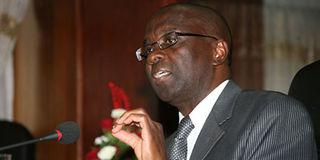Judges hiring case referred to Kenya CJ

Photo/FILE
The leadership of Dr Willy Mutunga (above) as head of the Judiciary will immediately be put to the test following the decision by women’s groups to move to court to challenge the appointment of the five Supreme Court judges by President Kibaki.
A petition challenging the nomination and appointment of five Supreme Court judges has been referred to the Chief Justice for further direction.
This sets the stage for Chief Justice Willy Mutunga to appoint a three-judge bench to hear the petition, just three days after picking another three-judge bench to hear an application challenging the appointment of Mr Keriako Tobiko as the Director of Public Prosecutions.
Lady Justice Jeanne Gacheche issued the ruling after lawyer Paul Muite, representing the Judicial Service Commission (JSC), argued that the petition had raised very substantive issues that cannot be heard by a single judge.
Mr Muite quoted Article 165 (4) of the Constitution, which says that any matter certified by the court as raising a substantive question of law shall be heard by an uneven number of judges, being not less than three, assigned by the Chief Justice.
“The order stopping the swearing-in of five Supreme Court judges is a weighty matter that is beyond dispute. We request that the file be sent to the Chief Justice to set up a three-judge bench to solve the matter quickly,” Mr Muite said.
Lawyer Philip Murgor, representing the Committee for the Implementation of the Constitution (CIC), concurred with Mr Muite, saying that the application should be given the utmost urgency it deserves.
Ms Judy Thongori of the Federation of Women Lawyers - Kenya (Fida-K) also agreed, saying, the whole country is concerned with the outcome of the petition, hence the need to handle it urgently. (READ: Plan to swear in five JSC nominees halted)
She requested the court to extend the orders restraining the Attorney-General, JSC and any State officer or State organ from going ahead with the swearing-in of the five Supreme Court judges until the petition is heard and determined.
Gender equity
Justice Gacheche issued the order on June 18 following an application by Fida-K, Centre for Rights Education and Awareness, the League of Kenya Women Voters, Women in Law and Development in Africa, Caucus for Women Leadership and Coalition on Violence Against Women.
The six applicants argued that the appointment of the five — Justice Philip Tunoi, Justice Jackton Boma Ojwang’, Justice Mohamed Ibrahim, Smokin Wanjala and Njoki Ndung’u — to the Supreme Court did not conform to the constitutional provision of gender equity.
They are accusing JSC of violating Article 27 of the Constitution, which says that not more than two thirds of those appointed shall be of the same gender and that men and women have the right to equal treatment.
In a replying affidavit, JSC argued that the allegation is without any legal or factual foundation because two of the Supreme Court Judges are female while five are male.




